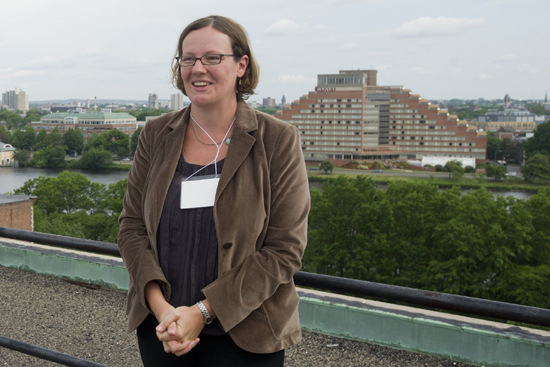Mushrooming Metropolises
CAS prof warns biodiversity imperiled by global urban growth

A paper recently coauthored by Lucy Hutyra, a CAS assistant professor of earth and environment, forecasts a tripling of urban spaces worldwide by 2013. Photo by Vernon Doucette
Let’s give two cheers for urbanization. Cities, being population-dense, can be more efficient users of such things as energy and transportation than their rural counterparts, and they can be centers of innovation as well, says Lucy Hutyra. Heck, as a College of Arts & Sciences scholar, she works in a city. But there are long-term costs to their growth, she says (and as the mother of a newborn, she’s into long-term thought mode).
In a paper cowritten with colleagues from Yale and Texas A&M, Hutyra—an assistant professor of earth and environment—forecasts a tripling of urban spaces worldwide by 2030 and breaks new ground by mapping where all those people will cluster (Africa, China, and India, notably). That growth, which at 463,000 square miles would total “more urban land expansion than in all of history,” could imperil habitats, threaten hundreds of plant and animal species with extinction, and denude forests, according to the report. Urbanization will also boost climate change: almost 75 percent of man-made greenhouse gas emissions originate from cities, Hutyra says.
Other groups—from the United Nations to the Census Bureau to nonprofits—have predicted population and urban explosions before. But this is the first study to forecast where the projected five billion new urbanites will live, and the first to look at the potential mayhem “on biodiversity and vegetation losses,” she says.
Part of the expansion, as well as its enabler, will be an infrastructure boom—roads, water and sanitary plants, energy and transportation systems—forecast to cost up to $30 billion by 2030. “Development often follows roads and the availability of resources” such as energy and water, says Hutyra. “We will be locked in to many of our infrastructure and energy choices for these new cities for many years to come.”
“Although urban land cover is a relatively small fraction of the total Earth surface, urban areas drive global environmental change,” the authors write in their paper, published in September in the online Proceedings of the National Academy of Sciences.“Land-cover change could lead to the loss of up to 4 percent of the species in some of the most biologically diverse areas around the world.”

To spare the environment, Hutyra says, cities of the future should avoid urban sprawl and use environmentally friendly energy sources. “Unfortunately, there is no universal best formula for development,” she says. “Local availability, climate, ecology, and social preferences need to be considered for sustainable urban planning.”
The researchers looked backward and forward to come up with their estimates: backward at the history of urban growth and forward via population and gross domestic product forecasts by the United Nations and its Intergovernmental Panel on Climate Change.
The paper acknowledges the clouds in its crystal ball: “History has proven some past projections of population growth”—a key engine of urbanization—“to be grossly inaccurate, and there still remain large uncertainties around population-growth estimates.” Hutyra cites the 1968 bestseller The Population Bomb, in which Stanford biologist Paul Erhlich wrote, in a way reminiscent of Chicken Little, that the 1970s would see mass starvation, rampant disease, and social turmoil from overpopulation. “Thankfully,” she says, “many of the predictions did not come to pass. Population growth rates and dynamics are notoriously difficult to predict as a whole, much less in a spatially specific manner,” as in her study.
The researchers also note that their findings exclude another, potentially significant, engine of Africa’s urbanization—the continent’s hard-to-measure black-market economy. They also didn’t study urbanization’s potential indirect hits to the environment. For example, city dwellers eat more meat than rural residents, and meat production requires vast energy production.
“Our choices in where and how we develop our future cities will determine the environmental impacts,” says Hutyra. “We certainly have opportunities to change the future.”

Comments & Discussion
Boston University moderates comments to facilitate an informed, substantive, civil conversation. Abusive, profane, self-promotional, misleading, incoherent or off-topic comments will be rejected. Moderators are staffed during regular business hours (EST) and can only accept comments written in English. Statistics or facts must include a citation or a link to the citation.